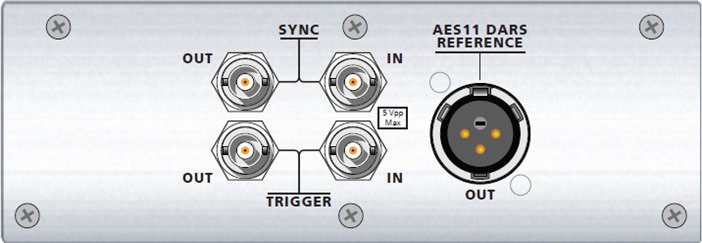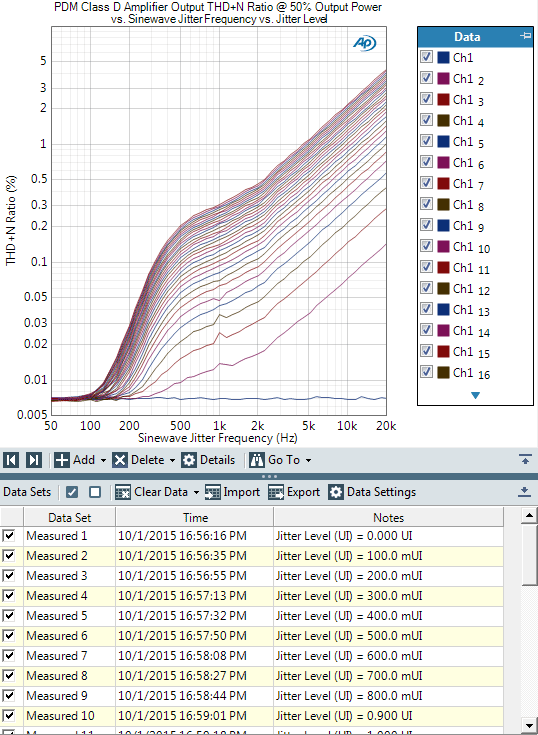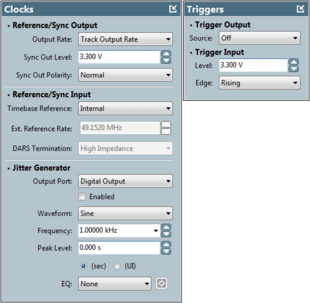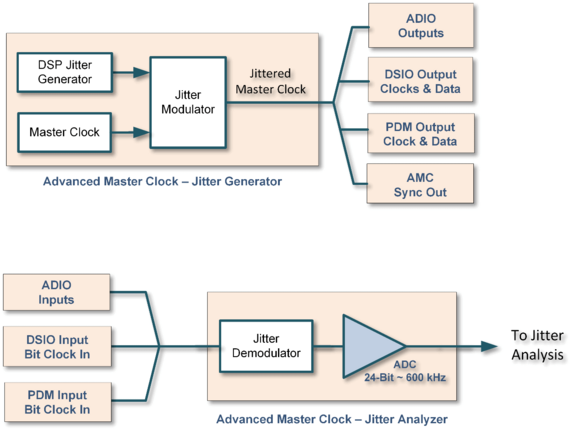Advanced Master Clock
Jitter Measurements, External Triggering, and Clock Synchronization for APx B Series Audio Analyzers

The Advance Master Clock (AMC)—standard on the B Series APx555 and optional for the APx52x and APx58x B Series audio analyzers—provides jitter, trigger, and clock synchronization features. AMC also offers jitter generation and analysis capabilities. As an option, AMC may be ordered with a new instrument or retrofitted to existing APx analyzers manufactured after 2012 (excluding APx515 or APx511).
Trigger
Inputs to the APx trigger system support triggering measurement acquisition for the scope and FFT functions of the APx software. Triggered acquisition is useful for audio measurement synchronized with turn on events in the device under test (DUT). Trigger output pulses may be generated at audio waveform zero crossings, sine burst intervals, start of wave file playback, and many other APx generator signal events.
Sync
The SYNC input connector permits clock synchronization of the APX master clock to an external clock source, such as a “house sync” for a 10 MHz lab standard clock source, or a master clock from a development board of a part under test. The SYNC output connector supplies a clock signal typically used to slave an external device to the master clock of the APx analyzer.
AES11 DARS Reference
The rear-panel XLR connector supports AES11 Digital Audio Reference Signal, a standard for professional audio sample rate synchronization. APx provides “audio black” at the output connector, conforming to AES3 (IEC60958-4), designed to connect to devices with AES3 XLR reference input.
Jitter
The AMC module adds sophisticated jitter generation and analysis capabilities to support APx digital audio interface options, including Digital Serial I/O (APX-DSIO), Advanced Digital I/O (APX-ADIO), and PDM (APX-PDM). The jitter generator provides a jittered master clock to the rear panel SYNC OUT and AES11 DARS REFERENCE OUT connectors to drive external devices.
The AMC jitter generator produces a jittered master clock that may be selected to drive APx ADIO, DSIO, PDM, and Sync/Ref outputs. The jitter analyzer demodulates clock inputs from ADIO, DSIO, or PDM inputs. APx software then performs measurements on the demodulated jitter signal.
APx software supports sweeps of jitter level and frequency, choice of jitter waveforms (sine, noise, square), and jitter measurements including time and frequency domain analysis. Jitter may be measured with all the meters traditionally associated with audio signals. The figure below graphs jitter tolerance of a PDM amplifier (output distortion increases with jitter) using nested jitter amplitude and frequency sweeps. More information on jitter

Class D amplifier jitter tolerance measurements with the AMC and PDM options
Full Specifications: For full specifications on the APx Advanced Master Clock module, please see the Installation and Specifications Guides for any of the modular APx audio analyzers:
APx555 Installation Instructions & Full Specifications
APx52x Series and APx58x Series Installation Instructions and Full Specifications

